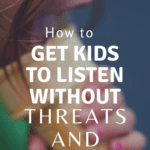I was recently asked tips on how to discipline a 4 year old who doesn’t listen. Learn how to how to get your child to listen the first time without bribes and threats. It is possible with natural consequences. These positive discipline tips work for kids of all ages, too!
My husband and I recently had a weekend away from the kids.
That sounds like the beginning to a wildly romantic post about the importance of date nights. It is not.
Instead, with those unfamiliarity relaxing moments, which lacked bum-wiping, power struggles, and snack-preparing, I did what many parents do. I used these calm moments to reflect on my mom guilt and the crappy things I was doing as a parent.
With a clear head, I realized that I was a “Bribe-Threat” Parent. My primary disciplinary method as a parent was throwing out ridiculous threats and outlandish bribes to guide my kids throughout life.
I’d yell threats like, “clean your toys or I am going to burn them all in the backyard”. When that failed, I’d resort to bribes such as, “if you clean up your toys, I will give you a lollipop”.
My kids never listened the first time I threw these bribes and threats out.
As a parent of three young kids, I wasn’t always dependent on this bribe-threat parenting method; however, it slowly became a faster and easier disciplinary solution as the chaos of three kids washed over me

Read on for how to discipline a 4 year old who doesn’t listen.
It seemed to feel like an effective way to discipline, instead of having long discussions around, “you should clean up your toys because you played with them, and that is the right thing to do so that our house doesn’t look like it was vandalized by a herd of elephants.”
During those toddler years, I had a hard time replying to bad behavior with logical consequences. And this bad habit just stuck.
Related: How to Discipline Highly Sensitive Kids
The Problem with the Bribe-Threat Discipline Approach
I hadn’t even realized that I was resorting to this method until I had a moment to reflect. I suddenly felt ridiculous that I relied on this method in my day-to-day life as a mom. It was no more effective than, “Do that, or ELSE”.
There were three big issues with this parenting method:
1) This Type of Discipline Portrays Weakness
It made me look weak to my young children in the first place. I did not portray myself as a strong parental figure when I was pleading with threats or bribes.
Similar to a stray dog, children pick up on your fears and weaknesses. When you are offering bribes for them to do what they should be doing, then you are putting them in control of the situation.
Children need to learn that being a good listener expected. They do not deserve a reward for listening to the rules.
You may also like: 5 Safety Issues your kids won’t know about unless you talk openly
2) It is a Super Ineffective Method
Although bribes and threats seemed like a quicker way to get my kids to listen, if I am being honest, it was not an effective discipline method at all.
Out of desperation, I once told my 4 year old son during a potty training phase that if he started to go on the potty I would buy him a big toy. He replied, “Well, I don’t want a big toy”.
Children will stop taking you seriously if these are overused; especially if you do not follow through.
Looking for other tips on how to discipline a 4 year old who doesn’t listen? Read about how to peacefully discipline a defiant kid.

Looking to improve communication? Try banning these 5 forbidden phrases in your home.
3) It is Not Practical in the Long Run
In the early years, as children are developing, the little lessons they learn will stay with them through life.
Learn other ways to Hardwire your Kid for Happiness Here.
I don’t want my children to complete tasks only for rewards or due to fear. I want them to understand what is good behavior and how to deal with natural consequences.
Related: Learn the Difference Between Meltdowns and Temper Tantrums
How to Discipline a Kid Who Doesn’t Listen
Even the term “positive discipline” feels like a catch 22. I assure you it is actually really easy.
The American Academy of Pediatrics (AAP) recommends that parents and caregivers use healthy forms of discipline. These include positive reinforcement of appropriate behaviors, setting limits, redirecting, and lastly, setting future expectations.
The AAP refers parents to their Healthy Children site for guidance. They suggest the following approach for dealing with children and rules.
1) Clear Expectations are Key
Establish some general rules and clear limits within your home.
For example, I will explain to my children that when they are done playing with toys, it is their responsibility to clean them up. When children do something against the rules, explain simply and in a few words.
- First, discuss that what they did was wrong.
- Then, explain what will happen if the behavior continues.
A great way to set these ground rules is to conduct a family meeting. Click here for simple tips to conducting an effective family meeting, and a free printable agenda.
You May Also Like: 3 Ways to Adjust Your Body Language when Talking to Kids
2) Provide Consequences for Their Behavior
It is important that the consequences are logical and natural. When my kids leave their toys out and I threaten to burn every toy in the home, I am not providing a natural consequence.
Get down on their level, take a deep breath, make eye contact, and be clear that if they chose negative behavior, there will be consequences of their actions.
For some, it is difficult to tell the difference between a natural consequence and a threat or punishment.
Example: It is cold outside and your 4 year old child doesn’t listen when you tell them to grab a coat. Instead of yelling at them and battling them to put on their coat, allow them to walk outside and feel the cold. They will most likely want to put their jacket on based on the natural consequence of going outside without a coat.
The consequence should be simple. If your children are leaving out their toys, you can explain that if they leave out a toy they will not be permitted to play with that toy for one day.

3) Take Time to Have These Discussions
It may take longer to have calm, logical conversations with your children; however, when you empower them with knowledge and respect you are setting them up to make good choices.
Children feel valued when parents take the time to talk with them. Talking often will help them gain self-confidence.
In fact, Kids who feel Valued have parents that ask these 5 Questions at the dinner table. A little bit of positive attention goes a long way and leads to better behavior.
4) Start a Chore Chart
Research also suggests that children who do chores have higher self-esteem, are more responsible, and are better equipped to deal with frustration.
When a child helps out at home, they take pride in their new skills and respect their family and home.
When is the right time to start a chore chart? Learn about it here and print your chore checklist.
5) Be a Positive Role Model
The best way to impact your child’s behavior is to set a good example.
Talk to your kids openly when you lose your temper. This is especially helpful for older children.
Demonstrate the appropriate way to act when things don’t go your way and you are angry or upset.
Drop what you are doing and listen to your kid when they have are asking you something.
The more you talk openly about your feelings and what you are doing, the more emotionally intelligent your child will be.
Final Thoughts on How to Discipline a 4 Year Old Who Doesn’t Listen
As we parent, we should be thinking about how we can prepare our children to be happy, well-adjusted adults.
The next time your kid is not being a good listener, follow these simple tips to see the old behavior slowly dissolve.
I don’t want them to listen to me only to get a lollipop or to avoid ridiculous, threats (that are usually bluffs, to be honest).
Their actions should be guided by their internal voice telling them what is right and wrong. They should understand that there are positive and negative, natural consequences to their actions.

It all starts now, when they have fresh minds, a positive outlook on life, and a parent who deeply cares about them.
Initially, I have no doubt that there will be more tears and longer battles, but when I remind myself that it is for my children’s future. It is time to say farewell to candy bribes and burning-of-toy threats in our home.
Have you been guilty of resorting to “The Bribe-Threat Parenting Method”? If so, I’d love to hear about it in the comments below!
If you learned how to discipline a 4 year old who doesn’t listen (or any age for that matter), follow us on Facebook. You’ll get more tips on raising kids who are healthy at home and strong in the world.


Bare Minimum or Lazy Parenting Strips out the Unnecessary and Focuses on What Matters - Simply Rooted Family
Wednesday 25th of May 2022
[…] minimum parenting teaches children about natural consequences very […]
The Best Strategies for Parenting a Seemingly Untamable, Defiant Child - Simply Rooted Family
Thursday 5th of May 2022
[…] positive reinforcement may feel anything but […]
The Top 10 Signs of a Spoiled Teenager and How to Fix the Damage - Simply Rooted Family
Thursday 5th of May 2022
[…] The first step is to quit disciplining with bribes or empty threats. […]
The Difference Between Calm Parenting and Explosive Parenting - Simply Rooted Family
Monday 25th of April 2022
[…] Learn more about positive discipline and positive logical consequences that help kids listen. […]
5 Common Ways Parents Cause Confusion and Instability for Kids - Simply Rooted Family
Tuesday 12th of April 2022
[…] To learn all about parenting with natural consequences, read this. […]